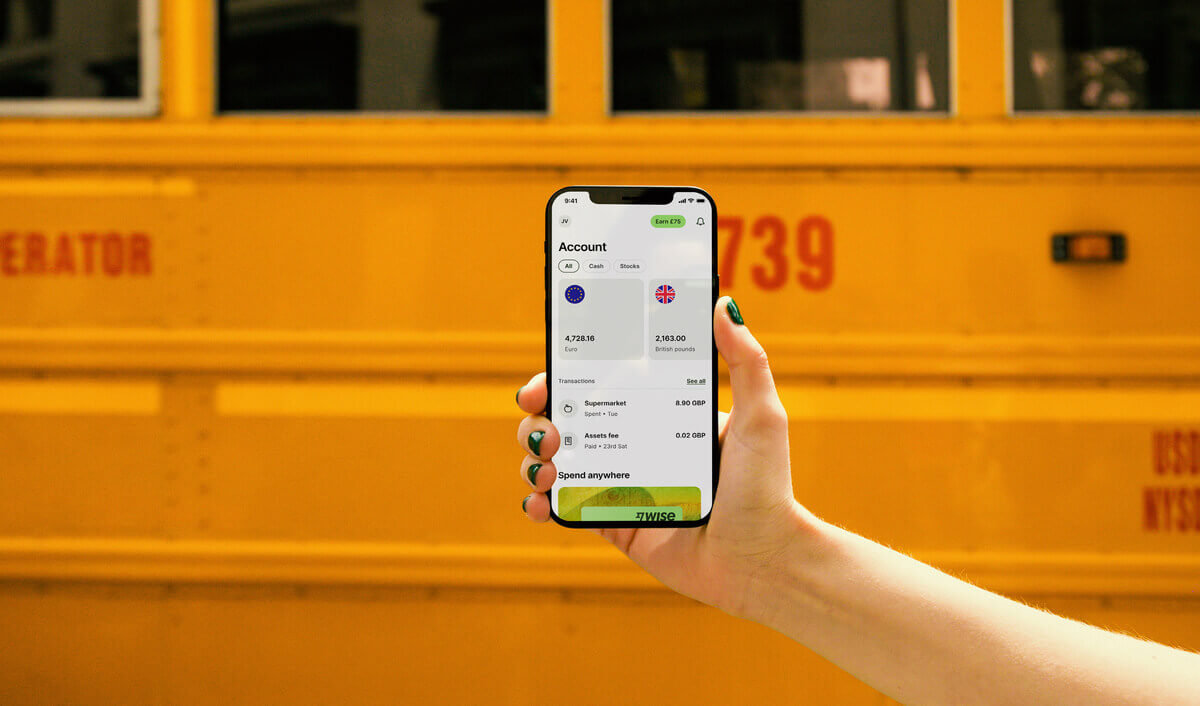Open account in TymeBank in South Africa: Complete Guide
Open an account with South Africa’s first exclusively digital bank. We help you understand everything you need to know!

Welcome to America! The land of freedom, opportunity and world-class education. Congratulations on making the big move, but this move entails some important decision making – like opening a bank account. Understanding the system can be stressful —with so many different options available as well as the differences in terminologies can make the process daunting. In this guide we help you understand the US banking system and inform you of the various options available in the market.
We also explore international transfers which have been made simpler with Wise - a money services provider. It’s a travel-friendly, international account that lets you send and spend in multiple currencies worldwide that too at the mid-market rate.
The most common types of bank accounts in the US are the checking account (a deposit account that you can use to pay bills) and the savings account (a deposit account for money you don’t need to spend right away). Paperwork required for your application to open an account may be slightly different for different banks and even between states.
We’ve put together a list of the documents generally needed for the process6:
A term that you will often come across is the Social Security Number (SSN), which is an essential aspect for your account application. This can pose a major obstacle for non-residents and non-citizens, but there could be other options that we discuss briefly in the following sections.
Can I open a bank account in the USA without proof of address?
You should bring proof of your current U.S. address, like a gas or electricity bill that clearly shows your name or address on it. Alternatively, any letter addressed to you from your utility providers may be accepted. If you're a student or working, you might bring documents regarding your workplace6. For example, some credit unions only allow you to join if you live or work in the credit union's service area.
Can I open a bank account in the USA without SSN?
Opening a bank account in the United States without a Social Security number (SSN) or individual taxpayer identification number (ITIN) is a possibility with ‘neobanks’ such as Revolut. However, if you opt for an interest-bearing account, such as a high-yield savings account or interest-earning checking account, you'll need an ITIN7. It's essential to be aware that any interest earned, no matter how small, is subject to U.S. taxes. So, even if it's just $10, it's important to consider the tax implications when opening such accounts.
If you’re a South African expat living in the USA, Wise can help you save money¹ when making international money transfers back to South Africa.
Although the majority of USA banks will allow expats to make international transactions, they normally add a markup onto the mid-market exchange rate, meaning you end up paying more for your transfer.
The mid-market exchange rate is the rate that banks use to transfer money between them and is considered the fairest rate in the market. Find out what you would pay for an international money transfer with a money services business like Wise:
Wise customers don’t have to pay an additional markup fee but only a small transparent fee to make an international transaction¹. That’s because Wise uses the mid-market rate for overseas payments!
With Wise, South African expats can save money¹ when making international payments from the USA to South Africa.
Opening a US-bank account from South Africa can be a tricky process. Since opening an account requires at least one in-person visit to the branch, it might be impractical to go all the way for just that appointment. Another major hurdle to the process is the absence of a Social Security Number. The lack of an SSN limits your banking options, you will still be able to open an account but only once you’re present in the US6.
Due to federal regulations and internal bank policies, you may find it difficult to open an account with an online bank if you're not a citizen. The various online banks operating are allowed to only open accounts for citizens or those with a residence permit in the United States that have documents to prove their U.S. street address. An in-person visit at least once is mandatory for almost every bank in the country, which makes the process of opening an online account complicated6.
You can always opt for an alternative to a bank account, the Wise account. With an online application needing just a few clicks², and you can start managing your money in 40+ currencies. Ideal for frequent travellers and immigrants to send money home at the mid-market rate, you can also receive money for free in 9 different currencies!
Banking in the USA is quite competitive, and you have a diverse range of options to choose from. To determine what bank suits you best it is important that you clearly define your priorities before making a decision. Here’s some information on the options available to help you make a wise choice.
What is the easiest bank account to open in the USA?
Banking in the USA is a tricky process for those who are new here. The biggest banks in the country have a ton of experience with international clients which makes it easier for South Africans looking to open an account.
Getting in touch with a bank representative or reading up on the website to learn about their requirements and if you match their criteria can help save a lot of time and effort.
The Top Four US banks:
The USA is home to some of the most renowned banking institutions. We take a look at the top four banks in the country in this section.
- Bank of America
The bank offers one main product for consumer banking, Advantage, under which come 3 different accounts. You have the Advantage Plus Checking for your daily banking needs, the very flexible Advantage SafeBalance or the premium Advantage Relationship which requires you to maintain a specific balance to get all its benefits8. The bank doesn’t have a special student account like its counterparts, but the Advantage account can be used by students with a waived monthly fee.
- Wells Fargo
You can open an Everyday Checking account with Wells Fargo with just $25, and if you’re a student aged 17-24, you can even swerve the monthly service fee9. Alternatively, meet a few pay-in and balance criteria and you can also avoid the $10 monthly charge9.
They offer Clear Access Banking – an account that targets students and young adults. It has exciting digital offerings as it has been designed for a younger audience. They do a monthly fee waiver if you meet certain criteria.
- JPMorgan Chase
A major player in the US banking scene, JPMorgan or ‘Chase’ bank as it is popularly known, presents a range of accounts for daily banking, students, and premium users.
The Chase Total Checking, their most popular checking account for everyday banking will charge you no fees if you deposit more than $500 a month10. The other accounts they offer include the Chase Secure Banking and Chase Premier Plus Checking. If you’re moving as a student you can check out their Chase College Checking account, offered to individuals aged between 17-24 years.
- Citibank
The accounts offered by Citibank are in tiers and are based largely on the amount of money you’re putting in them. With the bottom tier, you won’t need to maintain a minimum balance, and the monthly fees can be waived by meeting simple criteria like depositing money into your account regularly11.
Premium accounts are based on the combined average monthly balance: Citi Priority ($30,000 onwards), Citigold ($200,000 onwards), and Citigold Private Client ($1,000,000 onwards). They don’t offer an account for students.
Other banks to consider:
While the banks above are the top choices for many there are some others that deserve worthy mentions. Capital One’s 360 checking account has no fees and no minimum balance, and it offers 24/7 mobile banking. It also has more than 70,000 fee free ATMs around the country12.
Axos Bank on the other hand has exciting offerings for personal checking accounts like low or no fees, cashback on transactions and unlimited ATM withdrawals13. Be sure to also check the various online banks and money service providers available. SoFi, Quontic, Varo Money, Ally Bank, and Wise are all great alternatives that help you seamlessly manage money through apps to cover all your basic banking needs.
If you want a truly international account that works pretty much anywhere⁴, check out Wise. Wise is a money services provider, offering a multi-currency account, international money transfer services and a debit card.
Open a Wise account online and you can manage your money in multiple major currencies, including GBP, EUR, USD and many more⁴. When sending money internationally or converting currency, you’ll only pay a low, transparent fee¹ while also getting the mid-market exchange rate every time.
And, you can spend just like a local in multiple countries worldwide⁴ with your Wise card. It automatically converts currency whenever you spend, so there’s no need to change money or carry cash around with you.
Please see the Terms of Use for your region or visit Wise fees & pricing for the most up-to-date information on pricing and fees.
It is important that you are aware of a few basic fees before opening a bank account in the States. Do keep in mind that these entirely depend on the institution you’re choosing to bank with, the type of account you open, and even the money you put in monthly. Broadly speaking the two major fees you should be aware of are discussed below.
- ATM fees
These are usually only charged if you use an ATM from a bank other than your own. US banks may charge a fee if you are withdrawing money using their card overseas. Be sure to always opt for the local currency (rather than your home currency) or you could get hit with a steep exchange rate.
- International transfer fees
An important aspect to consider is the international transfer fee charged by these banks. We discuss charges from top four banks in the USA in the table below14:
| Bank | Receiving | Sending |
|---|---|---|
| Bank of America | $15 | $45 |
| Wells Fargo | $15 | $40 |
| JPMorgan Chase | Up to $15 | Up to $50 |
| Citibank | Up to $15 | Up to $35 |
While opening a U.S. bank account as a non-U.S. citizen is a bit of a tricky process, the benefits are far greater than the effort put in. And for all your international transactions you have Wise.

Using Wise, you can send money back home or spend money abroad⁴, all while getting the mid-market exchange rates.
Sources:
*Please see terms of use and product availability for your region or visit Wise fees and pricing for the most up to date pricing and fee information.
This publication is provided for general information purposes and does not constitute legal, tax or other professional advice from Wise Payments Limited or its subsidiaries and its affiliates, and it is not intended as a substitute for obtaining advice from a financial advisor or any other professional.
We make no representations, warranties or guarantees, whether expressed or implied, that the content in the publication is accurate, complete or up to date.

Open an account with South Africa’s first exclusively digital bank. We help you understand everything you need to know!

TymeBank Business account requirements, fees, process and much more: A guide to help you set up shop in South Africa

Discover how to open a bank account in Australia as a South African, including info about the documentation you need, the best Australian banks and more!

Your guide to opening your first bank account in Canada as a South African.

Considering moving to the UK for work? Find out if you’re eligible for a UK work visa, how your employer can sponsor you and if you can bring your family, too.

Dreaming about living and working in Oz? Our guide covers which working visas are available, how much it costs to apply, and how to find a job Down Under.